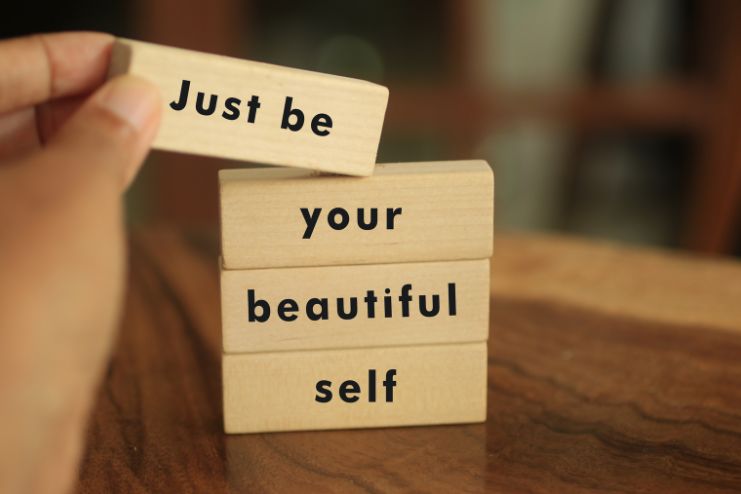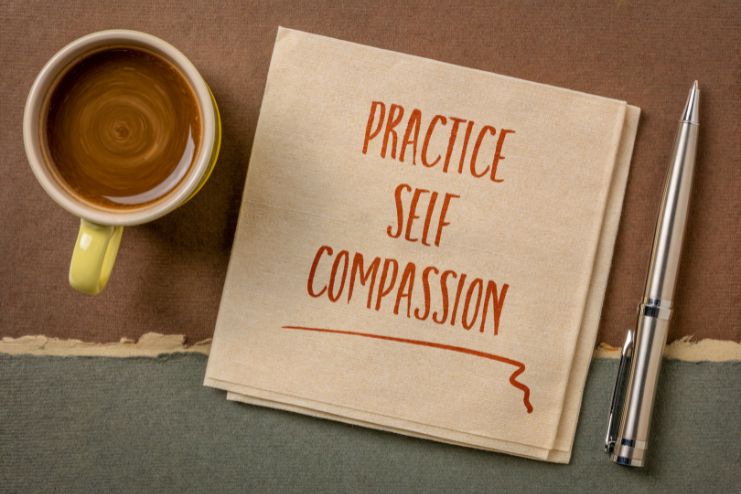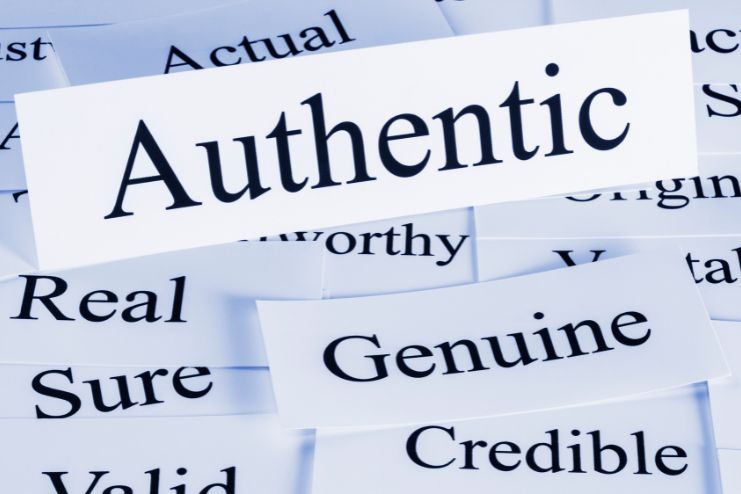AI Contribution
At HealthSpectra, we may use AI to refine grammar and structure, but every piece is shaped, checked, and approved by real people, our expert writers and editors, to ensure clarity, credibility, and care. Learn more..Affiliate Disclaimer
Some links in this article are affiliate links. We may earn a small commission if you make a purchase through these links, at no extra cost to you. We only recommend products we find useful to our readersIn a world that rewards appearance and approval, being yourself can be challenging. But authenticity and self-acceptance are the key to true mental and emotional well-being.
Authenticity is living according to your values, not another person’s script.
Self-acceptance is coming to terms with who you are, warts and all. But society tends to make us pursue perfection, and in the process of trying to fit in, we forget about our true selves.
This article delves into why embracing your imperfections and deciding to live authentically isn’t only courageous—it’s the key to genuine happiness and mental toughness.
Read More: 25 Amazing Self-Care Tips To Love Yourself Better!
Understanding Self-Acceptance

Fundamentally, self-acceptance is a process of transformation. It involves accepting your strengths and weaknesses with gentle judgment. It is a process of gently accepting who you are. Through it, you build a solid foundation for your mental and emotional health.
But this process isn’t always a breeze. Everybody has common setbacks along the journey. Some common barriers to self-acceptance are:
- Comparison – is a huge obstacle. When everyone is continually evaluating themselves against others, it creates an endless loop of dissatisfaction and insecurity.
- Self-criticism– is another dominant wall. People typically criticize themselves strongly for what they see as defects. This destabilizes their idea of self-value and makes self-acceptance more difficult.
- Fear of failure is also a big contributor. It becomes a powerful force that keeps individuals from embracing who they are.
To really unleash the power of self-acceptance, it’s necessary to understand these obstacles.
Acknowledging and challenging negative self-beliefs is the first step. This leads to self-compassion—a critical component of the process.
Read More: Best Mindfulness Journals for Anxiety and Self-Reflection
Embracing Imperfection
Accepting imperfection can be a strong antidote to the negative consequences of perfectionism. It can move us toward actual happiness and improved well-being.
If we examine the impact that perfectionism has on our mental health and our relationships, we can see that constantly striving to be perfect takes a toll. It makes individuals unhappier and causes stress to their relationships with others.
1. Let Go of Perfectionism

Embracing imperfection begins by recognizing that perfectionism is destroying our mental and emotional well-being.
It means we understand that we are not settling for anything less, but rather respecting our humanity and giving ourselves room to grow, fail, and attempt once more.
When we no longer pursue perfection and instead set healthy, balanced expectations, we build a mindset that leads to personal growth and self-compassion. This change allows us to flourish in a culture where progress is cherished more than flawlessness.
Progress is tangible, measurable, and incremental—yet it’s so easily ignored. Perfection, however, is difficult to define, almost impossible to achieve, and tends to result in stress, burnout, and chronic frustration.
This part highlights a valuable truth: actual success isn’t achieved by arriving at some idealized form of “perfect.” Rather, it’s achieved by simply showing up, putting in the work, and making consistent progress over time.
How to Let Go of Perfectionism
Perfectionism often feels like a high standard, but in reality, it can hold us back. Letting go of perfectionism isn’t about giving up—it’s about making space for growth, creativity, and self-acceptance. Here’s how to start.
- Shift Your Self-Talk: Replace harsh inner criticism with kindness and encouragement. A supportive inner voice reduces fear of failure and boosts motivation.
- Redefine Mistakes: See mistakes as learning moments, not personal flaws. This mindset builds emotional resilience and leads to a more fulfilling life.
- Embrace Authenticity: Perfectionism masks your true self. Letting go means allowing space for self-discovery, creativity, and honest living.
- Take Action
- Practice self-compassion
- Celebrate progress, not perfection
- Set realistic goals
- Speak to yourself like you would a friend
- Find Freedom in Imperfection: Embracing imperfection leads to greater well-being, deeper happiness, and a stronger connection with your authentic self.
Read More: Why Perfectionism Is More Harmful Than You Think (And How to Overcome It)
2. Cultivate Self-Compassion

Self-compassion is a necessary and powerful move toward embracing imperfection and developing inner resilience. It entails choosing to treat yourself with care and kindness, to the same extent and manner in which you would treat a good friend who is struggling.
How to Be More Self-Compassionate
Self-compassion is about treating yourself with the same care and understanding you’d offer a good friend. It’s a powerful way to build emotional resilience and a more balanced inner life. Here’s how to begin:
- Practice Mindful Awareness: Start by being present with your thoughts and emotions, without judgment.
- Notice how you feel without trying to fix or criticize it.
- Allow your experiences to come and go without labeling them as “good” or “bad.”
Mindfulness helps you develop greater self-awareness and acceptance over time.
- Use Self-Soothing Strategies: When stress or self-criticism shows up, reach for small, comforting actions that calm your nervous system. Try:
- Deep breathing or gentle movement
- Listening to calming music
- Saying kind words to yourself, like, “It’s okay to feel this way.”
These habits help create a more supportive inner voice during difficult moments.
- Validate Your Feelings: Remind yourself that your thoughts and emotions are real and valid.
- Say things like, “It makes sense that I feel this way.”
- Acknowledge your experiences without needing approval from others.
Self-validation strengthens your inner confidence and emotional stability.
- Build a Supportive Self-Relationship: Over time, these small shifts build a healthier, more caring relationship with yourself.
- Be patient with your struggles
- Be kind to your imperfections
- Stay open to growth and learning
The more self-compassion you cultivate, the more calm, confident, and connected you’ll feel—especially in life’s challenging moments.
Together, these habits build a strong emotional foundation. With increased self-compassion, you are more patient with your weaknesses, more kind to your flaws, and more receptive to learning.
In doing so, accepting imperfection is no longer merely acceptance—it’s a path to becoming your best self. It’s a profoundly affirming experience that results in a more resilient, stronger, and more satisfying life.
Read More: 12 Effective Ways To Stop Hating Yourself And Bring Out The Confident YOU!
3. Find Beauty in Flaws

The fascinating Japanese philosophy of wabi-sabi, which emphasizes the beauty found in the imperfect, defective, and fleeting, is entwined with the tapestry of imperfection. This encourages people to reconsider their perception of flaws.
Rather than viewing them as imperfections, it asks us to view our perceived flaws as individual strengths that contribute to our character and authenticity. The wabi-sabi philosophy challenges the conventional concept of perfection by reminding us to appreciate what is imperfect, old, and transitory.
When we take on this perspective, we start a path of self-discovery. We learn that real beauty isn’t an unattainable ideal—it’s in the actual, messy, and complicated aspects of life.
Wabi-sabi teaches us that the frayed edges, the cracks, and the so-called imperfections all speak. They don’t detract from who we are; they add to it.
This way of thinking asks us to celebrate our quirks, scars, and weirdness. These aren’t weaknesses—they’re what make every individual unique. When we begin not to view imperfections as things to be “fixed” but rather as part of our narrative, we develop self-acceptance. We learn to make the transition from self-criticism to self-celebration.
Embracing our imperfections doesn’t only enhance how we perceive ourselves—it also makes us more connected to life. It makes us feel more solid, more present, and more at ease with who we are. We cease pursuing unattainable ideals and begin enjoying the beauty of being real.
In doing so, wabi-sabi transcends mere idea—wabi-sabi evolves into a soft, liberating philosophy for living. It teaches us how to appreciate the actual over the ideal. When we accept the imperfect strata of ourselves, we start to live more freely, more lightly, with greater gratitude for life’s less-than-perfect journey.
4. Live Authentically

Living authentically isn’t about fitting in—it’s about aligning your outer life with your inner values. It’s the harmony between who you are and how you live.
Living authentically is an ongoing journey. It takes reflection, courage, and commitment—but it leads to a life that feels more real, more connected, and more meaningful.
How to Live More Authentically
Here’s how to begin living with greater truth, courage, and clarity.
- Start with Self-Awareness: Authenticity begins with understanding yourself.
- Take time to reflect on your thoughts, emotions, and core values.
- Ask: What matters most to me? What do I believe in?
The more you know yourself, the easier it is to make decisions and express yourself with confidence and clarity.
- Embrace Vulnerability: Being real means being open—even when it feels risky.
- Allow yourself to show up as you are, without pretending or hiding.
- Remember: vulnerability isn’t weakness—it’s a pathway to deeper connection and self-respect.
When you’re willing to be seen, you give others permission to do the same.
- Live with Integrity: Align your actions with your values.
- Make choices that reflect what you truly believe, not what’s popular or expected.
- Check in with yourself regularly to ensure your life reflects your truth.
Integrity is the foundation of authentic living—it brings clarity, purpose, and a deep sense of inner peace.
- Accept Yourself with Purpose: Authentic living also means embracing who you are—flaws, strengths, and all.
- Let go of the need for approval.
- Trust that being yourself is enough.
The more you accept yourself, the more empowered and intentional your life becomes.
- Bring It to Life: Real-life examples bring authenticity into focus.
- When someone speaks from the heart, even if it’s not socially accepted, they choose honesty over pretense.
- When someone sets clear boundaries, they honor their needs and self-respect.
- And when someone follows what brings them joy, despite judgment, they’re choosing alignment over approval.
Authentic living is multifaceted. It takes self-awareness, courage, and purpose—but it leads to deep, lasting satisfaction. Embrace openness, passion, and integrity, and you’ll create a life that feels not only real, but entirely your own.
Read More: 12 Alarming Signs That You’re Suffering From Anxiety Disorder
Conclusion

In conclusion, self-acceptance and authenticity can transform our lives. They make us more resilient, make us like ourselves better, and live with purpose. As we conclude this journey, let these concepts remind you to embrace your flaws, treat yourself nicely, and remain who you are.
We challenge you to live life with compassion and courage. Begin discovering who you truly are, and get started on becoming the best version of yourself.
Do this today: Consider one thing you can be more honest with yourself or others. Perhaps it’s being honest about how you feel, establishing a boundary, or doing something you love. Take that little step—because every step towards your authentic self counts.
-
Mar 2024Written by Ankita
-
May 2025Edited by Vaishnavi
You don’t have to be perfect to live a meaningful, joyful life. You just have to be real.
References
- https://plato.stanford.edu/entries/authenticity/
- https://medium.com/hlwf-healthcare-healthtech-lifesciences-wellness/self-acceptance-the-missing-key-to-your-personal-growth-development-bbbb19122c5b
- https://www.sciencedirect.com/topics/psychology/self-criticism
- https://sarahglinski.com/blog/how-to-let-go-of-perfectionism
- https://www.mentalhealth.com/library/self-soothing-techniques-distraction
- https://www.unbrokenself.com/living-with-integrity-and-authenticity/
In this Article



















